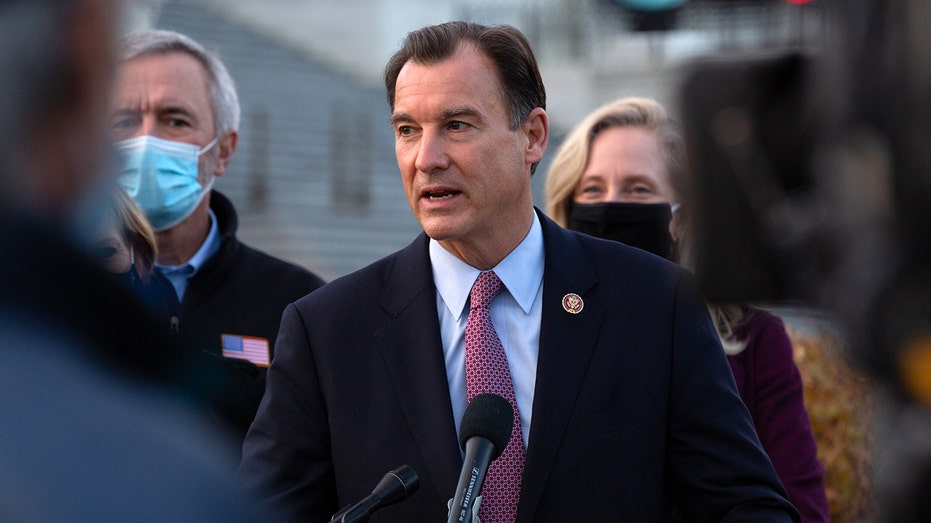Democrats may include tax cut that benefits wealthy Americans in Biden's huge spending plan
SALT repeal would disproportionately benefit wealthy Americans in blue states
Some Democrats look into SALT tax deductions for $3.5 trillion spending bill
Congressional correspondent Chad Pergram has the latest on the bill on 'Cavuto: Coast to Coast'
A coalition of moderate Democrats is aiming to repeal a Trump-era limit on state and local tax deductions as part of President Biden's signature spending plan, teeing up a showdown with progressives who say doing so would amount to a huge tax cut for the rich.
The so-called SALT deduction cap, which is poised to sunset in 2026, limits the amount of state and local taxes that Americans can deduct from their federal taxes to $10,000. Centrist Democrats have been pushing for months to include a full repeal in the president's $1.75 trillion "Build Back Better" plan, but have faced opposition from left-wing lawmakers.
Lawmakers are considering repealing the $10,000 cap through 2025 and offsetting the cost of doing so by imposing the deduction limit in subsequent years, Bloomberg reported, citing a Democratic aide familiar with discussions.
BIDEN PITCHES REVAMPED MILLIONAIRES TAX, GLOBAL MINIMUM TO FUND SPENDING BILL
"The cap on the SALT deduction remains a punishing blow to our home states of New York and New Jersey as we work to recover from the pandemic and get our economies on strong footing and our constituents back to work," Reps. Tom Suozzi of New York and Josh Gottheimer and Mikie Sherrill of New Jersey in a statement Tuesday.

WASHINGTON, DC - DECEMBER 21: Rep. Tom Suozzi (D-NY) speaks at the podium standing with members of the Problem Solvers Caucus to praise the forthcoming passage of the bipartisan emergency COVID-19 relief bill in a press conference outside the US Capi (Photo by Cheriss May/Getty Images)
"We will continue to work with House and Senate leadership to ensure the cap on the SALT deduction is repealed. No SALT, no deal. No SALT, no dice," the lawmakers added.
Still, eliminating the deduction limit would require Democrats to vote for a policy that disproportionately benefits wealthy Americans living in blue coastal states.
Households earning at least seven figures a year would receive the majority of the benefits, according to one analysis conducted by Tax Policy Center. About 25% of the benefits would go to the top 0.1% of U.S. households, which would receive an average tax cut of $145,000, while 57% would benefit the top 1%, which would see an average cut of $33,100.
Sen. Bernie Sanders, I-Vt., blasted reports that a SALT repeal may be included in the family and climate spending plan, calling it "unacceptable."

Senator Bernie Sanders, an Independent from Vermont, speaks during a news conference at the U.S. Capitol in Washington, D.C., U.S., on Wednesday, Oct. 6, 2021. Democrats and Republicans must decide in the next day or two how far to take their deadloc (Stefani Reynolds/Bloomberg via Getty Images / Getty Images)
"At a time of massive income and wealth inequality, the last thing we should be doing is giving more tax breaks to the very rich. Democrats campaigned and won on an agenda that demands that the very wealthy finally pay their fair share, not one that gives them more tax breaks," Sanders said in a statement. "I am open to a compromise approach which protects the middle class in high-tax states. I will not support more tax breaks for billionaires."
With a slimmest possible 50-50 Senate majority, it would be tenable for Sanders to sink a spending package that includes a full SALT repeal.
CLICK HERE TO READ MORE ON FOX BUSINESS
House Ways and Means Committee Chairman Richard Neal, D-Mass., told reporters Tuesday that discussions on the deduction cap are ongoing.
Biden did not include a SALT repeal in the framework that he unveiled last week, but the White House has previously said it's open to eliminating the deduction cap.
"It is not a revenue raiser and so it would add costs, and potentially significantly, to a package," White House press secretary told reporters over the summer. "There'd have to be a discussion about how that would be paid for what would be taken out instead. And then there's sort of a discussion of what's most important to achieving our overarching objectives."





















